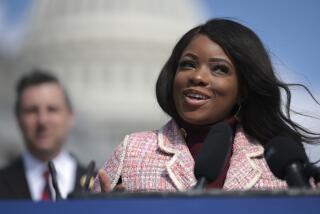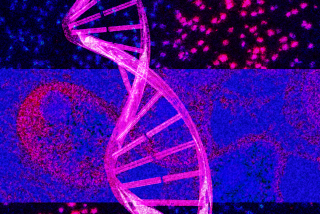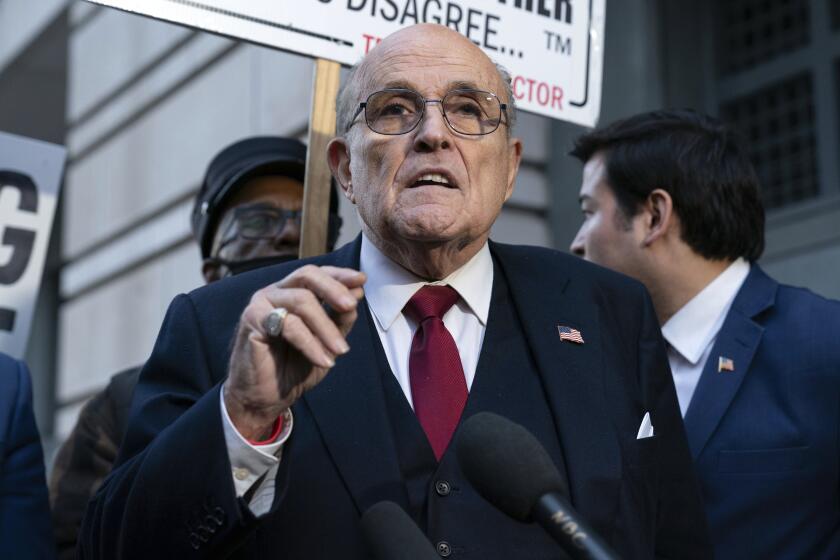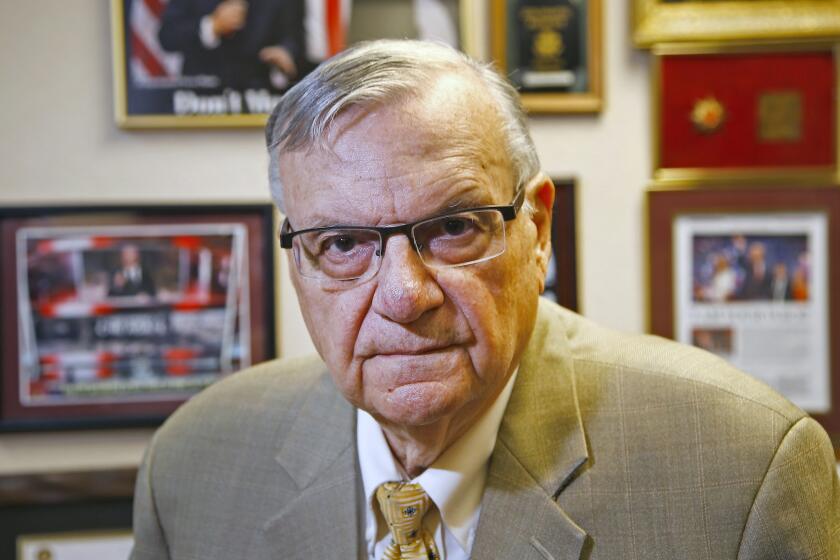Approach to Using Power Separates Riordan, Hayden
One of the candidates vying to run the nation’s second-largest city is a universally described “non-politician,” the other a self-proclaimed “anti-politician.”
Incumbent Los Angeles Mayor Richard J. Riordan has spent his life in the private sector, making money and giving it away. He never considered a career in politics, he says, until a year before his 1993 bid for the city’s top office. Challenger Tom Hayden, a Democratic state Senator, has built a career on government’s fringe, a perpetual antagonist of the status quo.
As a result, both are somewhat uncomfortable inside government.
Riordan, a Republican, rails against “big government” becoming “Big Brother”; after four years running City Hall, he condemns the place as “dysfunctional.”
Hayden quotes Henry David Thoreau: “That government is best that governs least.” If he is elected April 8, he plans to hire a staff that will help him “fight City Hall.”
In many ways, the essential question in this mayoral race is not what each man thinks about crime or transportation or education or the environment or economic development--but about governing.
“Power and accountability have to be put together in the city. They aren’t,” Riordan said. “It’s virtually impossible to hold someone accountable in the city. You can’t hold someone accountable unless they have the power.”
Hayden talks more about empowerment than power--about bucking authority.
“Too many people think you drop out to obtain clarity. I think if you drop out you find . . . the world is passing you by,” he said during a recent guest lecture at UCLA, referring to an essay by Czech President Vaclav Havel. “Be within the system and against it at the same time. There’s nothing outside the system. That’s an ecological truism: there’s nothing outside the universe. You’re not outside the system. You’re inside something.”
Hayden’s Conflicts With Authority
Hayden’s history of protesting the Vietnam War and getting arrested in the civil rights movement is well known. But it should be noted that his activism was spawned from student journalism, not student government. He spent most of his life banging on government’s doors, only entering its halls in 1982, when he joined the state Legislature.
“I was a normal kid in all respects except this: My mind was always wandering to the workings of the world,” he recalled of his childhood in the 1950s, an era he describes as “marked by the absence of politics.”
“Curiosity means that you have to question authority,” he continued. “So I was always getting in trouble with authority.”
It was as an editor at the Acorn, the newspaper at Royal Oak High School in Michigan, that Hayden first riled the rulers. Annoyed by overcrowding and the school’s split schedule--he attended class from 8 a.m. to noon while friends arrived for late shift--Hayden said he wrote an editorial that told administrators to “go to hell.”
He was promptly suspended.
“Journalism led me into conflicts with authority,” he said. “People who weren’t telling the truth. People who were discriminating against people.”
It has been like that ever since.
At the University of Michigan, he co-authored the Port Huron Statement, which scholars consider the founding document of the student movement that characterized the 1960s. He marched with the Rev. Martin Luther King Jr. He spent his 21st birthday in jail for civil disobedience. He went to Hanoi with his now ex-wife, Jane Fonda. He helped organize tenants in Newark, N.J.
After moving to California, he formed the Campaign for Economic Democracy, a movement and think tank, where he could do what he is most comfortable doing: writing and speaking. Even during the last 15 years, when he has held elective office, Hayden has often acted more like an investigative reporter trying to ferret out waste and scandal in Sacramento than a legislative leader.
“Tom is a deconstructionist. He would tend to be critical of every institution or large organization,” said state Senate Majority Leader Bill Lockyer (D-Hayward), mentioning Hayden’s fact-finding hearings on such issues as the UC Irvine fertility clinic scandal. “When he bumps into inevitable gaps between principle and practice, he likes to shine the spotlight on that gap.”
Hayden relishes that insider-outsider role.
“It’s like a fraternity, and you’re not a brother,” he explained to the UCLA class. “But they know you got there, and they can’t get rid of you. And they need your vote.”
Being mayor, Hayden believes, would be more about big-picture leadership than nitty-gritty governance. It would return him to a national stage where he once again can organize people to challenge the system.
He promises to run the city like Jerusalem’s longtime mayor Teddy Kollek, who drove around town in a van holding impromptu meetings on neighborhood concerns at the ground level. His road map for governing, in fact, comes from Kollek’s deputy mayor, Meron Benvenisti, who compared the cities of Belfast and Jerusalem in an academic paper Hayden believes also speaks to Los Angeles.
“Politics is the art of managing the insoluble,” he repeats practically everywhere he goes. “That’s a lot different than ‘politics is the art of compromise,’ where I have my view, you have your view and we end up with mush. Managing the insoluble means getting up in the morning and realizing we don’t all get along.”
Riordan as Problem-Solver
The mayor has no such lofty theories about government. He can’t remember who he voted for the first time he went to the ballot box, doesn’t recall any particularly influential teacher of social studies or political science.
To Riordan, government is like any other organization, no different from the businesses he restructured during his years as a venture capitalist. He seizes on a problem, and tries to solve it. Period.
“Are we doing the best we can? Have we learned from our competitors? Is it cost-efficient? What is the highest and best use of every buck? Are there rewards for excellent work, consequences for work not done?” Riordan chief of staff Robin Kramer said, mimicking her boss’ perpetual questions.
“In government, nobody wants to do anything without a perfect plan,” Riordan complains. “There is no perfect plan. The perfect plan gets so bogged down, it’s totally imperfect.”
If his administration has had a motto, it’s a paraphrase of Winston Churchill: Forgiveness is easier to obtain than permission. Act first--ask later.
“I think in terms of goals, where so much in politics, people think in terms of process,” the mayor said. “You’re in a meeting, and it will take an hour to get people to focus on goals because they’re so worried about all the things you have to do to get there.”
Riordan’s finest hour, City Hall observers agree, came when all the normal rules of government process were suspended: the 1994 Northridge earthquake.
“Dick Riordan is very good at quick response,” said Bill McCarley, the City Hall veteran who was then the mayor’s chief of staff. “He jumps in his Explorer. He was in the Emergency Operations Center. Why don’t these people have food? He called the [Original] Pantry, his own restaurant, and got the breakfasts. That’s when you saw the Dick Riordan who made $100 million.”
He won wide praise for the breakfasts, but for the mayor, there were more substantive lessons: That government employees make smart decisions and do great work when they have the chance. And that the city is too decentralized, with too many departments whose leaders have no incentive to work together and no one person accountable for anything.
When the crisis had waned, Riordan suggested the city name an emergency coordinator, to prevent the chaos he had witnessed during those hours when no one knew who was really in charge. The job was created, but instead of reporting to the mayor, the position is under the city administrative office, where Riordan worries it will suffer the same struggle.
“That person is going to have theoretical power, but how are they going to have real power?” Riordan asked. “I can bring departments together. . . . Even though I don’t have technical power, I have power because people listen to me.”
A Battle Over Charter Reform
From the mayor’s perspective, City Hall is rife with similar structural problems that slow down decision-making and obscure who is responsible for what.
Two different departments, for example, are responsible for recruiting, training and promoting police officers. And while voters recently gave the mayor power to fire heads of departments, requirements for special hearings and City Council approval dilute that authority and drag out the process for months. Then there’s Proposition 5, under which the council can review any decision made by the city’s 45 citizen commissions; the mayor thinks it is overused, intended simply as a check and balance but transformed into a weapon in a war between the executive and legislative branches.
These and other frustrations led Riordan last year to launch a full-scale review of the city’s 792-page governing document.
But while he has pumped $500,000 of his own money into the effort, raised more than $1 million from political supporters, and endorsed a slate of candidates for the commission in Tuesday’s election, Riordan refuses to cite specific things he wants to change. He says he will detail his proposals in public after the commission is seated.
Hayden has used $100,000 from his personal bank account to attack what he sees as Riordan’s attempt to grab more power through charter reform. On the stump, he offers his own ideas about how the system needs change.
The City Council should be expanded (though he is careful to say its budget should not) and some members should represent the whole city. The mayor should have a seat, perhaps ex-officio, on the Los Angeles Unified School District board. Citizen commissions should be abolished, or their power whittled down, and department heads should serve at the pleasure of the mayor.
Most important, Hayden says, is a recommendation from another charter reform commission whose work a generation ago was rejected by the voters: Neighborhood councils should be elected from the city’s 35 planning areas, and power over zoning and other community issues should be transferred--at least in part--to these councils.
Riordan, too, wants neighborhood councils. But he sees them as more advisory, and talks often of neighborhoods organizing themselves, then “partnering” with government on projects, rather than becoming a new wing of government, as Hayden suggests.
Both Riordan and Hayden frequently insist on the necessity of “empowering” Los Angeles’ neighborhoods. Their different notions of the limits of such power is what separates a “non-politician” from an “anti-politician.”
* DOWN TO THE WIRE
Tom Hayden posed with puppies, while Mayor Riordan collected more endorsements. B1
More to Read
Get the L.A. Times Politics newsletter
Deeply reported insights into legislation, politics and policy from Sacramento, Washington and beyond. In your inbox three times per week.
You may occasionally receive promotional content from the Los Angeles Times.






